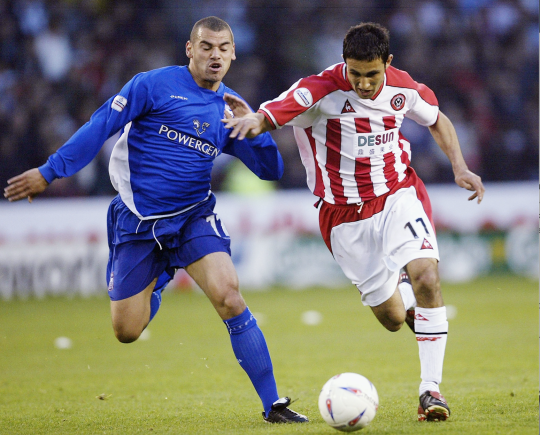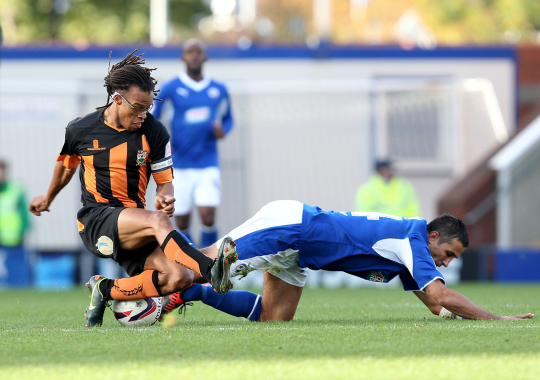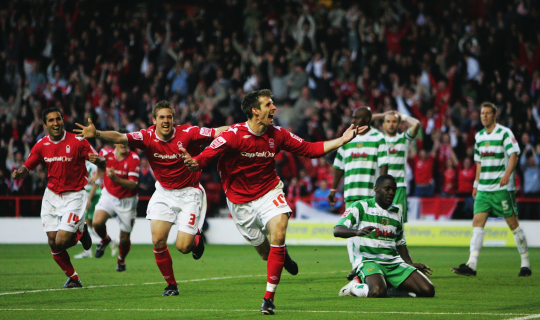Jack Lester: Coach players to want to win, not to want to earn more money
The former Grimsby, Nottingham Forest, Sheffield United and Chesterfield striker scored 177 goals in a professional career spanning 649 games. The 41 year old is now Forest’s under 23 Academy Coach and shares his ideas about helping young footballers to think better.
“The skill of the current football coach is not only to be creative, flexible, understand formations and produce quick decision making players, but also to awaken its stars and stars of the future to the falsehoods surrounding money and success.
Somewhere down the line we are diverted into thinking that the guy with the most money, most expensive watch, who flies first class and drives the latest sports car is now the most successful. In reality, the player who buys into that often goes on to underachieve until he retires and then more often than not suffers periods depression, fall outs and lack of fufilment.
That ‘perfect’ lifestyle is a media-created falsehood, promoted by advertisements, films, product placements, newspapers. I’ve been to these 5 star hotels, I don’t see laughter and smiling faces, but instead the unfulfilled, the bored, the average.
I’ve been to Christmas parties where the team paid thousands for the VIP treatment - only for someone else to have shelled out even more for the better table in a more elevated area while drinking more expensive champagne.
The best times are spent with those who are the most fun and most fulfilled, the rest is the celebrity haze we live in.
The friends that players lose quickly are those who appeared next to them in the VIP area, hangers on who haven’t got the energy to make a difference by themselves. We must help young players to think differently.
I believe a coach’s duty is to educate players not only in the fundamentals, the movements and the gold nuggets of information that can help on a football pitch, but also to sell the beauty of the game, to sell the attitude and not the money.
I ask my players if they’re playing for money and what they’re going to do when they get it. Down tools? Celebrate? They don’t have an answer. We invite the winners of our training games to stand on the line and be rewarded with extra running, while the losers watch their mates get fitter. We’re trying to ingrain that success equals work ethic, desire and resilience. Being allowed to get fitter is a treat, a privilege, a prize.

"Winners do more" is our line. When I played, the losers in training were put on the line to run as a punishment. I
never got it.
Show me a young player without a pair of Dre Beats headphones. It’s like a footballer’s members card. Training must redirect their thought process to what success actually is and what really are indicators that they are succeeding.
Is every player down this road to ruin? Absolutely not. There are role models in our industry and in our own first team at Forest for our young players to follow, but there need to be more and they need to be highlighted. I’m not suggesting that all players who buy expensive cars have lost their way. If you have all this money then get the car, why not? I would.
But we want them to maintain passion for what they do, as with all creative people, such as chefs, musicians and architects, those who inject passion into their craft stand miles ahead. A big part of a coach’s job is to ignite the players’ love for the game and to see high intensity work as a pleasurable way to express themselves. We also want them to be able to fail; to see the feedback they gain from that as a positive.
At Forest’s Academy we have recently changed our psychological model. Our previous ‘5 Cs’ model was aimed at altering behavior, but we now believe that if you want to alter behaviour, you have to dig further down to values. So we work to develop six character traits: courage, humility, desire, intelligence, resilience and to create ‘energisers’.
By their actions, body language and words, energisers as their name suggests inject energy into the group. We
celebrate when players show these qualities on the football pitch, as well as demonstrating and encouraging them off the pitch.
These are not meaningless terms. We are clear what these look like, they are shown videos underlining them, we spend time in various locations away from the pitch, from meeting rooms to the Lake District, looking to develop these traits. We encourage players to buy a homeless person a hot drink when they pass them, not so our PR team can film them and publicise it, but because it is cold.
Competing physically and mentally against your opponent and striving to conquer is what we love to see from our players, but humility in defeat or victory are as important too. We love them going to war with opponents, but that battle ends with the final whistle and always leave the pitch with a handshake.
Are we a soft touch? Absolutely not. We talk passionately about winning, what that means and the process. We work all week on the development of their game because we must also produce winners, who love that feeling, who want that feeling and are prepared to leave everything on the pitch. This is sport! Will a defeat hurt even if they can outwardly accept it with humility and grace? Absolutely, and I want it to.
I do hear comments such as: “There are no men, no Misters anymore” and “No one gets a grip of one another” but the environment and playgrounds that these players have come through is very different from that of mine and previous generations.
Fights were fought face-to-face, up close and personal. Today it’s from a distance, via the internet, social media or text, so then the presumption that a player can naturally go mentally and physically toe to toe is short-sighted.
Some of the young players need to be helped, need to be taught how to face an opponent with courage, and aggression.
Secondly, once a player breaks through, in this era, the rewards and trappings for mediocrity are massive. Where before only the champions and the best got rich, now just dip your toe in the big leagues and you get it all. We emphasize that achievements are winning a Championship, coming back from a goal down to win, reaching your fitness potential and pushing boundaries.
Money has flooded our industry and can’t be avoided, so the players need to have a different relationship with it. I’m fine with them having it, but they need to separate it from their successes on the pitch, and know having it doesn’t elevate their importance. On the other side of the scale, the players who don’t come through to the level they want can still find pleasure and fulfilment from the game when it is not defined by the wage they are paid to play it. The drop out from clubs is enormous. If a player is released from our club, but still goes on to find fulfilment from the game, then we have done our job.

Mistakenly we are told that footballers are role models. Why? Because they are rich? Because they are on TV? They have the opportunity to be one but it’s not a prerequisite. The reckless lad is still reckless, the good lad is still a good lad. If you offer both extortionate wages and the wrong message, don’t expect the reckless to become a role model.
He is the same lad as before, but under the spotlight being reckless and being able to make his mistakes flamboyantly. Cue the all too predictable path of self destruction, depression and playing career of underachievement, as his financial achievements makes him feel he’s already successful.
Our industry is littered with these sad stories. But they are not inevitable. I believe we need to help create good
people from a young age, help them understand that success is a product of hard work and solid values, success is feeling fulfilled, limelight allows you to be a role model though you aren’t one yet, and being great at football and the wealth that brings doesn’t mean you are a great man. How you act in the heat of battle, how you act after the whistle and how you live your life through your values will determine whether you are to be applauded or not.
And if you’re the parent who demand all these young kids act as role models for your children, you need to understand that you’re asking a young lad who is a product of his environment to see through the distractions and media haze and become a beacon of humanity with a scribble of a signature - and you’re going to be let down.
So, along with the changing pace and tactics of the game, we must help players understand how they feel about and relate to football and to ignore distractions. At Forest’s academy we study the selfless behaviours of Atletico Madrid players, the intensity that they choose to train and play at and what they have achieved as a result. We highlight they had to beat Barcelona and Real Madrid, financial powerhouses, to achieve success, and
they became Champions - we show them what’s possible.
We talk about the passion of others in other fields, looking at the passion that Stevie Wonder still sings with, after all his money and success. We want them to fall in love with the game, and to appreciate their experiences and opportunities, studying habits of the very best, to think big but not big time. Have we achieved this yet? No. As coaches we will always be making mistakes, learning and adjusting, though we are making progress, and our intentions are clear. Rewardingly, in some players we are seeing exciting breakthroughs with some terrific young men and players in the making. I am aware this is all idealistic and at times when I am taking about Stevie Wonder they may be thinking “What is he on about now?” but we are always passionate and want the best.
We are not just telling our players this to give us better performances. We are also trying to prepare them for what may come by helping them to appreciate the little things, being able to run, and being able to think, and to not get lost in the celebrity world. I believe that when you have players who play for the love of the game, who revel and thrive in the heat of the battle, and have solid values, you will have a team that wins matches, promotions and maybe one day can become Champions and can inspire others to do
the same. For me, striving for that is exciting and fundamental for sustained success in our sport.”

 Yahoo Sport
Yahoo Sport 












































